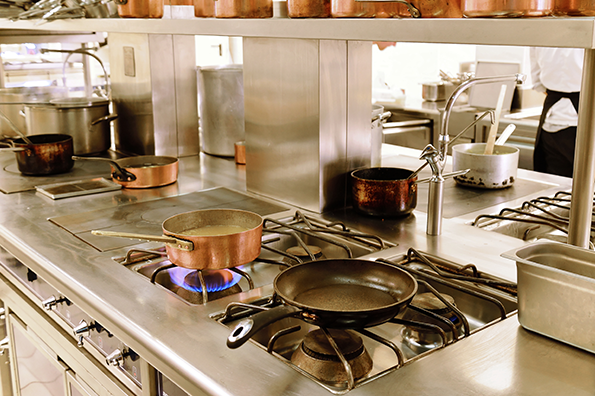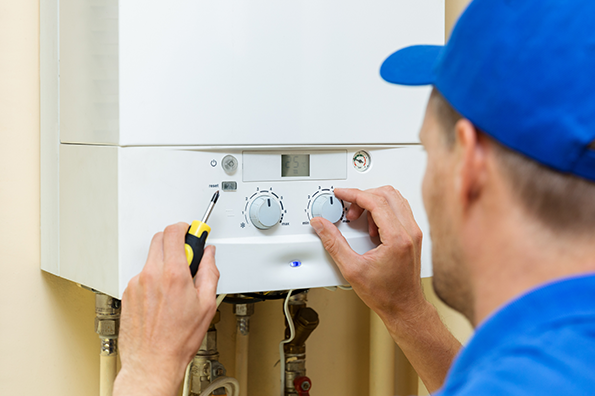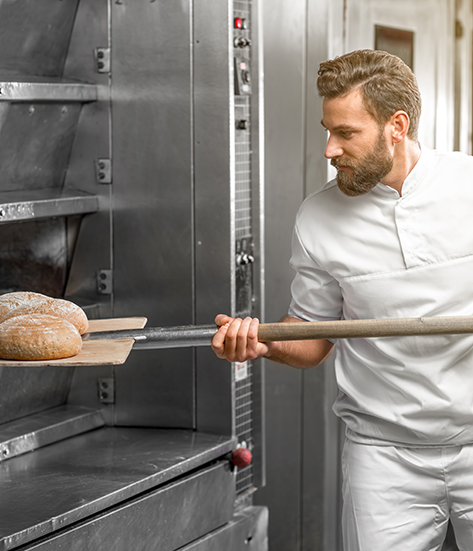A safe working environment for your workers
According to the legislation on well-being at work, as an employer you must provide your employees with a safe working environment.
Consequently, you are responsible for the inspection and maintenance of your business’s equipment, the necessary risk analyses, the information to the staff and any protection measures.
Which gas appliances are affected in businesses?
Appliances that run on natural gas in businesses often include:
- heating appliances: boilers, hot air generators, air heaters, infrared heaters (dark and light) and heat pumps;
- cogeneration appliances (production of heat and electricity);
- appliances producing hot water;
- professional cooking appliances: hobs, deep-fryers, grills, woks, rotisseries, etc.;
- appliances for washing (washing machines) or for drying (dryers);
- appliances for thermal industrial processes.

You must have all these appliances inspected, to be certain they run properly and safely after the conversion.
The conversion to rich gas only affects natural gas. It does not affect appliances running on gas in bottles (propane or butane) or on gas used by vehicles (LPG, CNG).
Get your gas appliances inspected
Are you unsure if your business is located in a municipality that will convert to rich gas? You can check to see if your municipality is affected by entering your postcode in the search field at the bottom of this page.
If you are affected, your distribution network operator and/or your supplier will notify you well in advance. Once you have been notified, and before the actual conversion, you will have to call on an ‘authorised technician’ to inspect, and possibly to adjust, all your gas appliances. This way you can be sure that the appliances will continue to run properly and safely on rich gas.
This inspection will be charged to you. Ask for this inspection in good time from your authorised technician, so that you can combine it with the next compulsory periodic inspection of your boiler.
Adapting the pressure regulator (limiter) on your gas meter
In some cases, a technician from your distribution network operator will have to adapt the pressure regulator on your gas meter. This adaptation is free of charge. Your network operator will do this at his own expense. This adaptation is essential for safety reasons. You are therefore required to allow your distribution network operator access to your meter.
No technicians will visit Brussels and much of the Antwerp conurbation, because these areas don’t have pressure regulators. This means nothing needs to be adapted.
To know how to recognise a technician from your distribution network operator, check the operator’s website.
Please note that industrial users provided with medium pressure by their gas supplier must have any low pressure equipment checked and, where necessary, have the pressure regulator adapted. This adaptation will be charged to them.
The conversion won’t make any difference to your gas bill
You pay per unit of energy (kWh) that you consume. The calculation on your bill (see FAQ) will look different, but if you use the same amount of energy you will pay the same as before.
Why is the inspection of your gas appliances essential?
If you don’t get your appliances inspected, this could pose a risk after the conversion. Indeed, your gas appliance may not run at optimum efficiency, for example because it produces more CO (carbon monoxide), it consumes more gas or it wears out faster.
A gas appliance in poor working order will cost more, is bad for the environment and might be harmful to your health and that of your colleagues. Regarding safety, remember that in most cases the rooms containing a gas appliance must have sufficient ventilation and must comply with the various safety standards in this field.

Some gas appliances are not compatible with rich gas.
Gas appliances produced from 1978 onwards are generally compatible with rich gas, but sometimes they must be adapted to run properly and in complete safety.
Gas appliances made before 1978 will generally not be compatible, which means they will likely have to be replaced.
Gas appliances purchased in other countries likely do not meet the legal standards in force in Belgium. They must be replaced or made compatible with Belgian legislation if technically
possible, provided the age of the appliance still enables this and provided the operational safety can be guaranteed. Only the manufacturer can provide professional advice on this.
Consequently it is essential to have all your gas appliances inspected by an authorised technician. This technician will also be able to check whether all the installation environment conditions are met, in order to ensure your safety and that of your colleagues. That way, you can sleep soundly.
Ask your technician for a visit report indicating which of your appliances have been inspected and any adaptations made. This will provide you with documentary evidence of the technician’s visit and any work carried out.
The inspection can only be done by an authorised technician
Inspection of your gas appliances must be done by an authorised technician, which means someone qualified to do so. There are three types of authorised technician:
- a technician certified by your region to carry out the compulsory periodic inspection of boilers: a GI or GII technician;
- a technician from your appliance’s manufacturer;
- a technician from the official distributor designated by the manufacturer of your appliance brand.
You can consult the list of technicians who are certified by your region for the compulsory periodic inspection of boilers: simply enter your postcode below.
What does the inspection cost?
The cost of the inspection and any adaptation of your gas appliances will depend on the number and type of appliances that have to be inspected, as well as the fees of your authorised technician. We estimate that in most cases it will cost you anything between
€ 0 and € 150 for 1 to 3 appliances (non-contractual estimation - September 2017). This estimation is based on monitoring of prices charged on the market and takes into account a broad range of applicable technical factors. For large or professional appliances, you should contact your authorised technician. You should ask for several price offers and take advantage of the competition.
If you ask for this inspection in good time, you can combine it with the next compulsory periodic inspection of your boiler.
This way, you won’t have to call your technician twice and pay his travel costs twice.

Landlord or tenant: who pays what?
It is the responsibility of the owner of any gas appliance to check the appliance’s compatibility with rich gas and for any adaptation of the appliance.
The landlord of a rented building must pay the costs for the inspection and any adaptation of the gas appliances that they own.
The tenant must pay the costs of the inspection and any adaptation of the gas appliances that they own. Furthermore, the tenant must give the landlord’s authorized technician access to their building.
As a tenant, always check whether or not your rental contract includes a clause that makes you responsible for the costs of the inspection and adaptation of your landlord’s gas appliances.
As a tenant, don't forget to notify your landlord of the conversion, and of their obligation to carry out an inspection and to make any necessary adaptations to the gas appliances in their building. That’s because the tenant will be alerted about the date of the conversion to rich gas by the distribution network operator and/or the gas supplier. It is therefore your responsibility to alert your landlord.
Do you have any questions?
See the ‘Frequently Asked Questions’ (FAQ),
or contact the Contact Center of FPS Economy
on 0800 120 33 (free-of-charge in Belgium)
or by e-mail: info.eco@economie.fgov.be.

